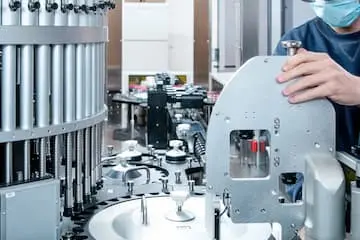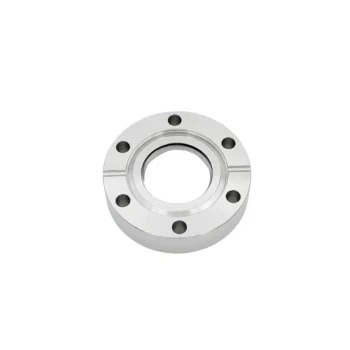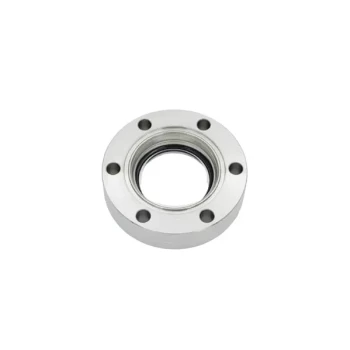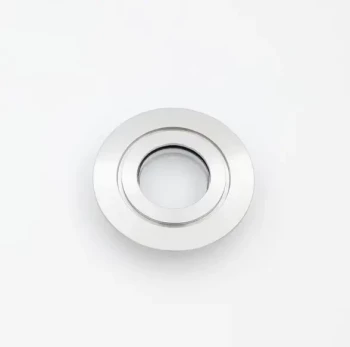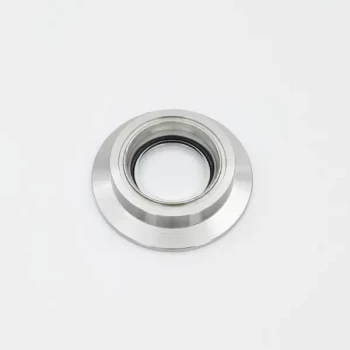In the realm of high-performance vacuum systems, precise control and reliable observation are paramount. Our vacuum accessories cater to a variety of applications, including semiconductor manufacturing, vacuum coating, and scientific research. From ultra-high vacuum observation windows with sapphire and borosilicate glass to stainless steel flanges and bellows, our products ensure clear observation, durable design, and easy installation. Additionally, our vacuum ball valves and quick release clamps provide superior sealing and efficient connections, making them ideal for high-vacuum environments.
Toggle Categories
Get Instant Support
Choose your preferred way to connect with our team
-
Get Free Quote Fill out form for detailed pricing
-
Send Email Detailed inquiry support
-
WhatsApp Quick mobile chat
Response Time
Within 8 hours on working days, 24 hours on holidays
Vacuum Accessories

Stainless Steel Quick Release Vacuum Chain Three-Section Clamp
Item Number: KT-VA06

KF/ISO/CF Ultra-High Vacuum Stainless Steel Flange Pipe/Straight Pipe/Tee/Cross
Item Number: KT-VA07

CF KF Flange Vacuum Electrode Feedthrough Lead Sealing Assembly for Vacuum Systems
Item Number: KT-VA08

304 316 Stainless Steel Vacuum Ball Valve Stop Valve for High Vacuum Systems
Item Number: KT-VA11

KF ISO Stainless Steel Vacuum Flange Blind Plate for High Vacuum Systems
Item Number: KT-VA12
Advanced Vacuum Accessories for Precision Control
Our vacuum accessories are engineered to meet the stringent demands of high-performance systems across various industries. Whether you're in semiconductor manufacturing, vacuum coating, or scientific research, our products offer unparalleled precision and reliability.
Ultra-High Vacuum Observation Windows
Our ultra-high vacuum observation windows feature sapphire and high borosilicate glass, ensuring clear and reliable observation in extreme environments. These windows are available in both CF and KF flange configurations, providing flexibility for different system requirements. The sapphire glass offers superior durability and scratch resistance, while the high borosilicate glass provides excellent optical clarity and thermal stability. These windows are perfect for applications where continuous observation is critical, such as in semiconductor manufacturing and vacuum coating processes.
Stainless Steel Flanges and Bellows
Our stainless steel flanges and bellows are designed for efficient connections and stable vacuum environments. Made from high-quality 304 and 316 stainless steel, these components offer excellent sealing and durability. The bellows, in particular, are ideal for applications requiring flexible connections without compromising on vacuum integrity. They are widely used in high-performance vacuum systems, ensuring reliable operation and long-term stability.
Vacuum Ball Valves and Quick Release Clamps
For precise control in high-vacuum environments, our vacuum ball valves and quick release clamps are indispensable. These components are made from corrosion-resistant 304/316 stainless steel, ensuring durability and long-term performance. The ball valves provide accurate flow control, while the quick release clamps offer easy installation and superior sealing. Both products are designed to meet the rigorous demands of high-vacuum systems, ensuring efficient operation and reliable performance.
Customizable Solutions
We understand that every application has unique requirements. That's why we offer customizable solutions for our vacuum accessories. Whether you need specific flange configurations, customized glass types, or tailored bellows dimensions, our team of experts is here to assist you. We work closely with our clients to ensure that our products meet their exact specifications, providing the highest level of professionalism and service.
Why Choose Us?
Our commitment to quality, precision, and customer satisfaction sets us apart. We use advanced manufacturing techniques and high-quality materials to ensure that our vacuum accessories deliver optimal performance. Our products are designed to withstand the harshest environments, providing reliable operation and long-term durability. Whether you're in semiconductor manufacturing, vacuum coating, or scientific research, our vacuum accessories are the ideal choice for your high-performance systems.
Ready to enhance your vacuum system? Contact us today to discuss your specific needs and explore our comprehensive range of vacuum accessories. Let us help you achieve precision control and reliable operation in your high-vacuum environments.
FAQ
What Is An Electrode In Electrochemistry?
What Are The 3 Electrodes In Electrochemistry?
What Are The Different Types Of Electrochemical Electrodes?
What Materials Are Commonly Used For Electrochemical Electrodes?
What Factors Should Be Considered When Selecting An Electrochemical Electrode?
How Can Electrochemical Electrodes Be Used In Various Applications?
REQUEST A QUOTE
Our professional team will reply to you within one business day. Please feel free to contact us!
Related Articles

The Architecture of Containment: Selecting Materials for Super-Sealed Electrolytic Cells
The vessel defines the experiment. Explore the engineering trade-offs between Borosilicate Glass, Quartz, and PTFE to ensure accurate electrochemical data.

The Silent Geometry of Voltage: Respecting the Limits of Electrolysis
Electrolysis relies on strict electrical boundaries. Learn why exceeding rated current and voltage isn't just inefficient—it's destructive.

The Architecture of Emptiness: Diagnosing and Fixing Vacuum Furnace Leaks
Master the art of vacuum leak detection. Learn systematic strategies for hot and cold furnaces using helium tracers, smoke tests, and oxygen analysis.

The Invisible Interface: Why Simple Connections Define Complex Chemistry
In electrochemistry, data integrity relies on the physical interface. Discover why the humble copper tape and gasket seal are the true guardians of your results.

The Architecture of Accuracy: Why the Electrolytic Cell Lid is Your Most Critical Interface
There is no universal standard for electrolytic cell lids, though Φ6.2mm and Φ3.2mm are common. Learn why precise aperture configuration is vital for data integrity.

The Art of Nothing: Why Critical Engineering Demands Vacuum Brazing
Discover how vacuum furnace brazing eliminates oxidation for superior joint integrity, the physics of vapor pressure, and why material selection dictates the process.

The Architecture of Certainty: Mastering Control in Multifunctional Electrolytic Cells
Precision in electrochemistry isn't about guesswork; it's about hardware architecture. Learn how the three-electrode system isolates variables for true control.

The Symphony of Silence: Molybdenum and the Architecture of the Vacuum Hot Zone
Why do we trust Molybdenum in the most extreme environments? Explore the engineering logic behind all-metal hot zones and the pursuit of absolute purity.

The Silent Partner: Why Material Choice in Electrochemistry is a Matter of Trust
Discover why high borosilicate glass and PTFE are the non-negotiable standards for electrolytic cells. A deep dive into material science for precise data.

Risk-Proof Your Lab: How to Choose a Vacuum Pump That Avoids Costly Failures
Learn how to choose reliable lab vacuum pumps to avoid costly failures. Assess chemical risks, throughput needs & safety for optimal performance.

How to Choose Laboratory Vacuum Pumps for Maximum Efficiency and Cost Savings
Learn how to choose the right lab vacuum pump for efficiency & cost savings. Compare oil-sealed vs. oil-free pumps & future-proof your investment.

How to Choose and Optimize Water Circulating Vacuum Pumps for Your Lab
Learn how to choose and optimize water circulating vacuum pumps for lab applications, balancing efficiency and reliability.

Water Circulating Vacuum Pumps: A Practical Guide for Laboratory Applications
Discover the benefits of water circulating vacuum pumps for labs: chemical safety, low maintenance, and explosion-proof operation. Ideal for sensitive applications.

How to Choose Crucible Materials That Prevent Chemical Degradation in Vacuum Induction Melting
Learn how to choose crucible materials for vacuum induction melting to prevent chemical degradation and optimize alloy purity. Essential guide for industrial applications.

How Freeze-Drying Cuts Transport Costs by 90% in Critical Logistics
Freeze-drying slashes transport costs by 90% in logistics for space, military, and disaster relief by reducing weight and volume. Learn how it works.

Freeze-Drying Decoded: The Science Behind Preserving Food, Medicine, and Research Materials
Discover how freeze-drying preserves food, medicine, and research materials with unmatched efficiency. Learn the science behind lyophilization and its applications.

Why Freeze-Drying is Indispensable for Preserving Sensitive Samples
Freeze-drying preserves sensitive samples by sublimation, maintaining molecular integrity and enabling stable, room-temperature storage. Essential for proteins, vaccines, and volatile compounds.

How Freeze-Drying Protects Delicate Biological Structures During Water Removal
Freeze-drying preserves biological samples by removing water without structural damage, ideal for vaccines, enzymes, and microbial cultures. Learn how it works.

Beyond the Spec Sheet: Matching Freeze Dryer Capabilities to Your Application's Critical Needs
Choose the right freeze dryer for pharma, food, or biotech. Key specs like cold trap temp, vacuum, and cooling rate impact drying speed and product quality.

How to use PTFE to improve the working efficiency of pumps and valves
Polytetrafluoroethylene (PTFE) has become a key material for improving the efficiency of pumps and valves due to its unique physical and chemical properties.
